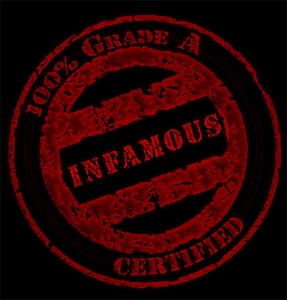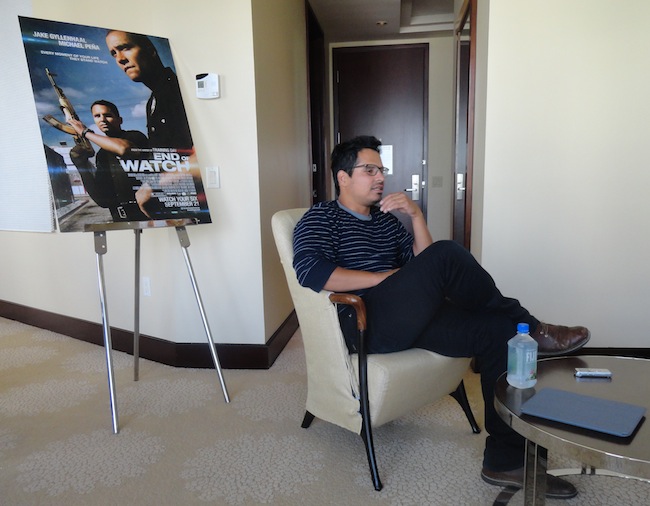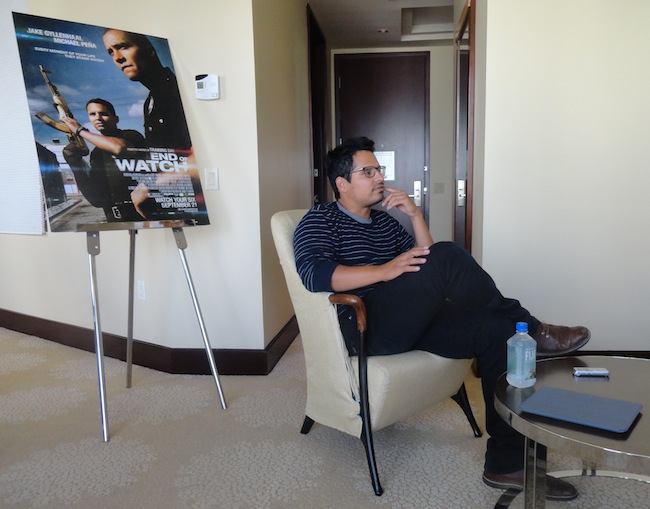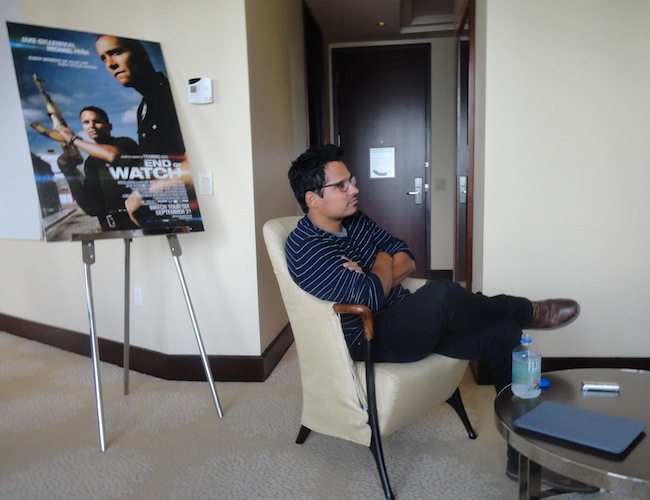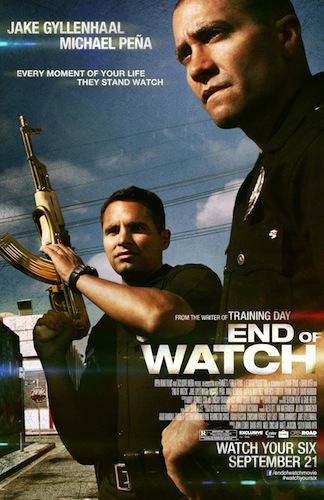
Michael Peña has been in a little bit of everything over the course of his cinematic career. Since making his film debut back in 1994 in RUNNING FREE, his strong character work in both supporting and lead roles has populated more than a few films. You're absolutely sure you've seen him in something, but quite often, he's blended into a film's atmosphere so well that it's hard to pick out where.
GONE IN 60 SECONDS, BUFFALO SOLDIERS, CRASH, MILLION DOLLAR BABY, BABEL, WORLD TRADE CENTER, SHOOTER, LIONS FOR LAMBS, THE LUCKY ONES, OBSERVE AND REPORT, EVERYTHING MUST GO, BATTLE: LOS ANGELES, THE LINCOLN LAWYER, 30 MINUTES OR LESS and TOWER HEIST - that's really the lay of the land for Peña. A lot of good films that benefited from his involvement, but none so more as his new movie END OF WATCH, in which he plays Officer Mike Zavala, one half of an LAPD partnership aiming to protect and serve in the middle of gang territory. This is easily Peña's biggest role to date and easily his finest performance, adding not only his half of the chemistry with Jake Gyllenhaal to get you to like the characters, but the emotional needed for you to invest in them for what gradually becomes an intense movie experience.
I had spoken with Michael once before when he was making the rounds for BATTLE: LOS ANGELES, and while he's a naturally funny and lively guy, his approach to this movie is a bit more serious. You get the sense of how proud he is of END OF WATCH and how badly he would like to see audiences come out and appreciate what really is a stellar film. Sometimes you can just tell when an actor knows they've made something special. This was one of those talks. Enjoy...
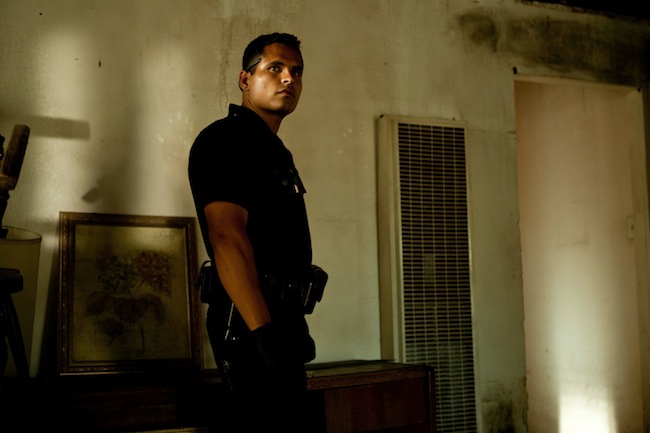
The Infamous Billy The Kidd: So it’s really hard to find a cop movie these days that deals with real cops. A lot of it is kind of mismatched comedic duos or you have kind of a bumbling donut eating kind of character or dirty cops. It’s very difficult to find stories about just real cops, regular guys doing the job. Why do you think that is, that Hollywood doesn’t gravitate towards stories of just good guys?
Michael Peña: Because I think they are harder to tell. I think only a guy like David Ayer could actually tell this kind of story of two guys that are in essence good human beings and if you think about it like in a three act structure it’s pretty hard with the introduction of the characters and then the second act “What’s the dilemma? Are people going to be bored?” So he kind of wrote this thing, which kind of reminds me of a David Mamet kind of thing where they bicker and they talk and they relate and they fight and they are friends at the same time, like I think it was a pretty genius way to go about it. There’s been a couple of movies in the past that do it, but I think it’s the hardest thing to do. It’s much easier to do somebody who’s corrupt and it gives you an easy motivation to go against the system or whatnot, but it’s definitely harder, infinitely harder when you have two guys that are good, and the dialog that David writes is like a slice of life of what happens on a regular day basis which policemen.
The Kidd: And it feels that there’s chemistry there between you and Jake to make it feel real, to make it feel that these are guys who are friends, who know each other really well and there’s a lot of ball busting kind of quality that goes with it. Is that in the script, as far as the dialog is concerned, or did you guys go off to try to bond so that it feels very naturalistic when you’re sitting in a squad car and going back and forth with each other?
Michael Peña: It’s literally on the first page. There’s two things, one “This is going to be shot like POV through like cell phones and security cameras and all of that stuff” and then the second thing is “These guys are more than brothers” and you’re like “Oh man…” That’s the hardest thing to play, dude. For some reason anything like with history is the hardest thing to play, like the marriage also, with Natalie Martinez was tough. It’s like you have to get beyond all of the social graces and the social tone that you have with other people and it was tough. Thank god we had like five months, because the first two months didn’t really go all that well (Laughs) and then I was just talking about it with David and he’s like “Dude, become best friends right now” and I’m like… But that’s the kind of thing that I think makes a movie like this, not to be cheesy, but special, you really have to work at that to make it… It lives and breathes off the brotherhood and we really tried a lot and worked on it for months to have that, to try to be really specific with that kind of thing.
The Kidd: That’s one of the things that I think the film really gets right, that brotherhood, this sense of family, that you’re in a car with this guy or this woman everyday and you see them all of the time, so they become more than just a partner, they become an extension of your family to a point. Is that something that you really talked about when you were doing research for the role and were you surprised with how deep that goes? These guys really live for one another, whether it’s… It’s still just one giant family that seems to branch outward.
Michael Peña: Yeah, that was a huge discussion and that’s why David Ayer made us train so much and it’s like… It’s funny, because you read it and it’s like “Okay, they have a real brotherhood” and you read in the script and it’s like one sentence and then you actually go to work on it and it takes five months to really have that brotherhood and that was the first thing that he wanted to nail down and he says “It’s going to live or die off this thing.” Also, if you think about it there’s gangs that are blood in, blood out, so they have that similar type of mentality to a certain extent, so I’m like “You’re fighting those people that are actually willing to die for their cause, just like you are.” One of them is trying to sell drugs and make money and the other one is to try to make the neighborhood a better place.
The Kidd: In your character building what was important to you in making this character unique and very lifelike? It’s not a traditional cop movie that you would see today where everything is kind of built off action set pieces or explosions or what not, it’s very character driven, so what was important to you to build that character to fit you?
Michael Peña: At the end of the day, to be honest, it was just the acting. You wanted to be as natural as possible and we fought really, really hard to make it look like improvisation and that’s the thing. It’s actually super hard to do. If you know the script of if you learn it that morning… We wanted to make it as real as possible, so literally we divulged everything. “How’s your sister?” “Oh, I just went and visited my brother…” and we constantly kept talking and then we were in character a lot of the time when we were training and we were fighting against each other doing weapons training and stuff. It was really incredible, but we kept talking and talking. It was like “How are we going to do that?” And the thing is, the more you talk about how you wanted to do it, the more you discovered about each other and we just had a passion for this project and it put a lot of pressure on us, but we really wanted to get this brotherhood down. Do you know what I mean? There was one time where we were bickering or whatever and then David was like “That’s good.” He’s like “Use that.” I’m like “Oh, okay that’s cool.” Then we would just be talking and he would let us fight kind of. “That’s not cool!” “Dude, whatever man. Just do your fucking job!” It was tough, man. It was tough doing this movie, because there’s a lot of pressure and you’re like “How is this guy going to be my brother?” Within those questions lay the answers just like this, just being totally honest, and it takes a little bit more work to do that.
The Kidd: How much leeway is there to the conversations and how much of that is in the script? You say there was an approach to make it feel very much improvisational and as a result you have what feels like these natural kind of friendly exchanges of two guys that know each other, but clearly take digs at each other when they get the chance. So how much of that was already on the page and how much of that was David saying “Okay…” like when you’re doing the impersonations of each other as far as the Mexican families and the Caucasian family with the quinceañeras and how much of that is already on the page and how much of that is…?
Michael Peña: Ninety-eight percent of it is definitely on the page and the things that we improvised were things that we already talked about, so they didn’t really seem like improvisation. It was like “Oh, should I put it here? Should I put it there?” It was funny, because David Ayer is married to a Mexican woman and him and Jake were like “What do you think?” “It’s awesome, bro…” and all of the things he was saying were things my character was saying and he was trying to give him life advice and I’m like “Wow man” even though he’s a white guy. He’s like an honorary Mexican. He knows really good Spanish and whatnot, but it’s so weird. They have a specific way of talking, which is really difficult to nail down, which is why I think it needed four or five months to rehearse and have this kind of extensive rehearsal period, it’s because it was almost like a play, almost like a David Mamet play where you really hit hard with all of the dialog and then we did improvise during rehearsals, but it was all talk, like “Do that…” and then he would write while we were doing a scene. He would write…. He’s a genius. Sometimes he wrote… We were like “Hey, how about if we did this. Remember when we were talking about that?” You know, the scene where I said I would take care of… “If anything happened to you, I would take care of your kids and your family.” He wrote that like in twenty minutes and it’s like a three page scene and we were hammered. Dude, we were literally hammered. I don’t even remember filming that scene, but Jake… We were totally devoted, and Jake doesn’t even drink. I show up and I’m like “What are you doing, bro?” It was for the wedding and I’m like “What are you doing, dude?” He’s like “Yeah, we’re going to do it.” So we got smashed and wasted at the same time, but that’s the kind of movie it was, the kind of filmmaking like those 70s movies when all of these people talk like at the ACTOR’S STUDIO and all of that, we were really going for it and it was a special movie for me, because there didn’t feel like there was a whole like of acting going on.
The Kidd: The film I think makes a really interesting point about heroism. There’s that discussion after the house fire sequence about what it feels like to be a hero. In talking to cops in preparing for the role, what kind of sense did you get from them? These aren’t guys who are looking for recognition or metals, this is work, like they go to work and they do what they do and it’s their training and instinctual for them. What was your feel on their approach to the job? They’re not doing it for heroism.
Michael Peña: It’s like a feel and real. It’s a completely different thing and every person that I interviewed that actually got some kind of metal, they were almost embarrassed by it, because there’s such a brotherhood in the precinct or wherever you’re working at that you don’t want to be the odd man out and also boasting isn’t really super cool for cops. They are just doing their everyday thing. They are acting on instinct and they don’t want to be considered any different, you know? These are guys… it’s really odd though, like with actors they get awards and give acceptance speeches and here when we went to the medal of honor, the guys are like “Thank you very much, I was just doing my job.” And David made us go to that and I was like “Wow, this is completely opposite of what I thought, completely opposite of what people usually think cops would be.” They try to talk it down as much as possible and I remember at the metal of honor ceremony it was just odd and kind of weird, because they were taking responsibility for what they did, but they weren’t acting humble at all. They were really humble and it was the kind of thing that they always put credit to the people and the training and stuff. It’s this kind of selfless virtue that they had, which you kind of have to have in order for you to be a good partner and make sure that your partner comes home safe.
The Kidd: What are your feelings on cops’ reputation, because they get a bad wrap through the media and bad incidents, which get played up, but also TV and movies I think play a lot into that, because of the tendency to go with corrupt cops? How did you reconcile what the perception is as opposed to what you were able to actually see by going in depth with them?
Michael Peña: It was really simple, because I actually went back at Wikipedia and Googled LAPD crimes or whatever and there was like a handful of crimes, kind of shitty, but yeah those guys fucked up a handful of times and it’s cool, but then you easily outweigh it with one ride along. They do like five stops and they stop like five crimes from happening just one day and we went on five months of ride alongs and it far outweighed… I guess that’s the nature of the beast. You’re not going to be like “This person busted this… and seized this many guns…” They’re just not going to publicize that and it happens all of the time. What you are going to publicize is the five times they fucked up or five times. There’s a lot more good, like ninety percent good or more and then there’s the ten percent or five percent that actually happens. I think this movie tells the story of what happens for the majority of the time.
The Kidd: I want to ask you really quickly about GANGSTER SQUAD, because at this point we could have easily been talking about that film and the film getting pushed back due to what happened in Aurora. Warner Brothers, I think, was kind of in a no-win situation with ultimately what they chose to do, but I wanted to get your take on how you think it was handled, whether or not you think it should have been reshot or you think it should have been released uncut with that movie theater scene.
Michael Peña: I think Warner Brothers did a great job. We reshot one of the big climactic scenes and totally changed it, which they didn’t really have to do, because they flipped it where the release date now is in January. I don’t know if every studio would have done it, but they would have been like “You know what? It’s enough time for people to forget” and they spent a lot of money on reshooting it. It was in China town, which is closing off a bunch of streets, which definitely cost a bit of money and they changed the release date. So literally all of the publicity that they did for the three months coming up to it were kind of thrown away. Do you know what I mean? Now they have to redo it probably starting in November or December and publicize one of their big movies. I think they did the right thing. They’re not these money hungry people that… It can easily go that way, but I was just really impressed. Even reshooting it, getting new pages, I was like “Wow, these guys really went all out.”
The Kidd: All right, thank you very much.
Michael Peña: Right on.
END OF WATCH opens in theatres this Friday, September 21.
-Billy Donnelly
"The Infamous Billy The Kidd"
Follow me on Twitter.
